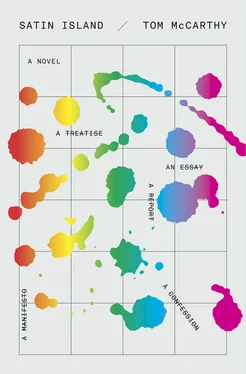14.8Gantries were coming down now. People were streaming to the doors. The MTA man was announcing, through his megaphone, that the 3:30 ferry had arrived. He repeated the announcement several times. He did this in a ritualized, almost incantatory manner — as though his annunciation of the boat’s arrival were a necessary component of the arrival itself, one without which the event could not complete its course. The floor shuddered as the ferry’s hull made contact with the buffers. I could make its name out: Spirit of Change . Above the writing, in a little cabin topped with radar masts, I could see the captain talking into his radio. Radio-crackle broke out to my right and left: from the MTA man’s walkie-talkie, and from those of security personnel scattered about the terminal. It mingled with the crackling of popcorn: several people near me were eating this as they watched the ferry dock, then watched the passengers who’d travelled with it to Manhattan disembark. These arriving passengers looked, in dress and general demeanour, just like the departing ones, but were segregated from the latter by glass walls that led them down a side-tube to the building’s exit. Once the last of them had trickled out, the sliding doors opened, and the people thronged around me made towards them.
14.9I was carried with them, with this throng of people; standing in their midst, I didn’t have much choice. Since the terminal was shaped like a big V, the crowd grew more and more compressed the closer to the bottom of this V it moved, like sand-grains running through an hourglass. I tried to recall my flight’s departure time; I still had a few more hours. Beyond the glass walls, in the sky, I could see other aeroplanes, all angled sharply up- or downwards as they rose from or descended into Newark. Up or down, whichever direction they had come from or were heading in, their vapour trails all met, again in big V s, over Staten Island. They were pointing there; the sky was pointing there; the wind was blowing that way, bearing gliding seagulls down flight-corridors that led there, arranging cloud-wisps into lines that ran along the same paths as the vapour trails. On the ground, flags were straining at their poles in that direction too; all the cranes in Red Hook and New Jersey were angled that way; even the Statue of Liberty pointed towards the grey lump. The mass of people in the terminal started compressing even tighter as the glass walls’ funnel grew still narrower, till we became, collectively, a Vanuatan arrowhead, being flighted now across this harbour, on an arced trajectory with the same, inevitable destination, it seemed, as everything else, only a few more feet of terminal and gantry remaining between us and the pyonngg! of irreversible release …
14.10I didn’t let myself be carried through the doors, though: at the last instant, I held back. This wasn’t easy: bodies were wedging me in on all sides. I had to push against them, turn myself around, then hoist and grab at passing arms and shoulders in order to move the other way. At some point, in that final stretch, I’d made my mind up not to take the ferry after all. To go to Staten Island —actually go there — would have been profoundly meaningless. What would it, in reality, have solved, or resolved? Nothing. What tangible nesting space would I have discovered there, and for what concrete purpose? None. Not to go there was, of course, profoundly meaningless as well. And so I found myself, as I waded back through the relentless stream of people, struggling just to stay in the same place, suspended between two types of meaninglessness. Did I choose the right one? I don’t know. I worked my way out to the side, and stood watching the crowd parading by. Their tight-packedness made them edge and shuffle rather than flow, a stop-start rhythm that was nonetheless placid rather than agitated, their stares fixed not on the back of the person right in front of them (although their eyes all pointed there) but rather on some abstract spot beyond this, or, perhaps, on nothing. The thought struck me that I should be filming this scene on my phone for Daniel, or, perhaps, myself — but I didn’t act on this thought. I just stood there, watching. The man on crutches shuffled by; and the one with the wig; and the ones in polyester suits; and the ones in plain, casual clothes. Many had small backpacks, most of which were loose-strung over single shoulders; one young man, though, had a larger one strapped tightly to his back, over both shoulders and around his waist, but hadn’t closed it: cloth-like fabric of a fleshy hue was trailing slightly from its unzipped opening. A woman with striped black and yellow shoes edged past me, and for a fleeting instant I thought it was the Minister. It was my jet-lag kicking in, colliding times and places in my head. I saw, amidst the mesh of limbs and torsos, a large bump on someone’s neck. I didn’t see their face — only their neck, and this just for a second. Helicopters thrummed again; I thought of humming-birds; again a radio crackled, and some children, possibly the ones with the candy-floss, or maybe other ones, processed by. The crowd thinned out; late arrivals scurried past me; then the doors closed; and, almost immediately, the gantries, like the drawbridge to some castle that I’d never enter, were hoisted back up.
14.11Through the closed doors, their salt-flecked glass, I watched the ship reversing from its berth, churning the water as its hull bumped against the buffers on each side. Once in the open water, it swung round, then made a beeline for the lump on the horizon. Staten Island was no longer grey, and it had grown: the sun was right behind it now, haloing it, transmuting it into a brilliant orange pool that spread across the harbour like a second mass of water, one set on a slightly different plane that spilled across the first one when the two planes intersected. This pool of light was spreading right towards the ferry, swallowing it up, dismantling it pixel by orange pixel. Its haze spread even further, past the boat’s still-discernible stern, turning the ferry’s wake, and those of other vessels, a metallic, silvery shade. There were scores of wakes, crossing each other in irregular and tangled patterns. Networks of kinship: the phrase flashed across my mind; I snorted with derision. Three or four other people who’d been standing in the terminal hadn’t taken the boat either. They, like me, stood looking at the harbour, at the light, each other. Were they anthropologists as well? Of course not: the radios of two of them identified them as plain-clothes security personnel; another was the MTA man, megaphone now hanging at his side. The fourth was a homeless guy working his way along a row of payphones. That was it: for a few moments there were just the five of us on the empty concourse, stood (it seemed) in some kind of formal arrangement whose logic escaped me, amidst discarded popcorn cartons, like a sparse matinee audience at some movie in which nothing happens. A cleaning machine whined into action, brushes slowly rotating as it crawled across the floor, squirting disinfectant. Then the first passengers for the next ferry started trickling in, and the whole cycle started up again.
14.12I was, as I mentioned, jet-lagged: disorientated, undirected. I’d travelled down to the Staten Island Ferry Terminal to take the ferry and not taken it, or perhaps just travelled down there to not take the ferry. I’d been standing in the same spot for some time now. So, too, had the plain-clothes security personnel, and the MTA man. As the concourse filled up with incoming passengers, our arrangement, its sculpted geometry, which had impressed itself upon me with such clarity and (at the same time) mystery for a few minutes, faded back into the general mass of bodies. It was still there, though, camouflaged or buried: none of us had moved. The homeless guy was still there, too, going slowly down the row of payphones, searching for forgotten change caught in their mechanism. In his attempt to trigger its release, he lifted each receiver from its cradle and held it up for a few seconds, waiting for coins to drop. None did. I looked out at the harbour once again. The dazzle on the water now was all-consuming, overexposed, blinding: the departed ferry, Staten Island, all the other landmarks and most of the sky had disappeared in a great holocaust of light, whose retinal after-effects, in turn, made the terminal’s interior too dark when I turned back to it. It took a few more seconds for the levels to adjust. I found myself still looking at the homeless guy. He was still holding a receiver away from his ear, making no attempt to listen to or talk into it. He looked all wrong; anachronistic. Who uses payphones these days? I wondered if these ones even worked. I stared at him; our eyes met for a while; then I, uncomfortable, broke off the contact and started walking, past the growing stream of people, out of the terminal and back into the city.
Читать дальше












